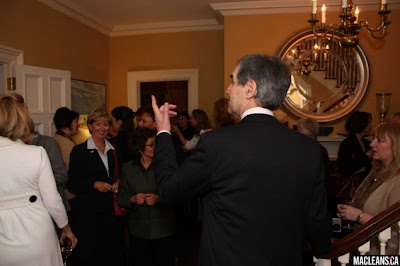The media suffer from duplicity. They chastise political parties for perpetual "election" talk, when it's they in fact that pour over every sentence to raise the temperature, so THEY can talk about a possible election. Sometimes they don't even require an idle quote, in amongst a much more telling paragraph uttered, they just see any area of conflict and RUN with it. If the media is tired of election talk, I assure you we are all more tired of their lazy frames that manufacture real election talk (generalizing of course).
The Liberals are pushing in Parliament, no question. The Liberals have made EI reform a pivotal issue. Let's face it, without the Liberals on board Jack and Gilles could bellow forever and nothing would happen, Harper wouldn't move, because he simply doesn't have to. Throw a determined Ignatieff into the midst, the game has changed, there's enough support that the government must respond. The government must respond, because they don't WANT an election- is this really a newsflash to anybody? More the "sky is blue" realities, the NDP and Bloc don't WANT an election. Even if one of them did, it's still irrelevant because BOTH MUST want to, so let's just say an election isn't in the cards, nope, nada. Liberals can add, unlike some people (hey there Jimmer!).
Does everybody think the Liberals are without strategic sense? A pretty self-evident review of the landscape reveals an opportunity to assert ourselves, without much risk of actually pushing Parliament over the edge. Equating a firm stance on EI as "Liberals clammoring" for an election fails to recognize LEVERAGE. Parliament is brinkmanship, you don't get what you want unless you convey strength, committed and your opponents fear you. For the first time in a long time, that's the dynamic the Liberals enjoy. Ignatieff doesn't have to cower, he can push and be forceful, because he knows full well the other parties aren't keen. It's really no different than the NDP exploiting past Liberal weakness to introduce non-confidence this, non-confidence that.
Do the Liberals want an election? I'm sure a few do, the polls are positive, but I can say with reasonable certainty, the "hawk" camp is in the minority, most are looking to the fall now as the realistic window. To conclude then, that talk that a compromise on EI will leave the Liberals wanting, is just asinine partisan tripe. If we get a deal on EI, no matter what "coalition" of parties agree, it will be because everyone is trying to get to the summer break. From the Liberal perspective, a few more months to ramp up fundraising, organization, attract a strong slate, etc, etc, that's always been the real gameplan, the majority view. If the EI issue is resolved, to some extent, then the Liberals have succeeded in their demands, they got what they wanted and they didn't have to "prop up" anybody. I fail to see any reasonable observer suggesting otherwise, no matter the final configuration of parties that make "backroom" deals.
"Liberals thwarted", more like Liberals get a concession on their key demand coming out of the convention. Concession that only came about because Liberals were strong and prepared, letting others dance around like they did in the past. And, everybody returns to Plan A, without much fuss. That's the bottomline.







